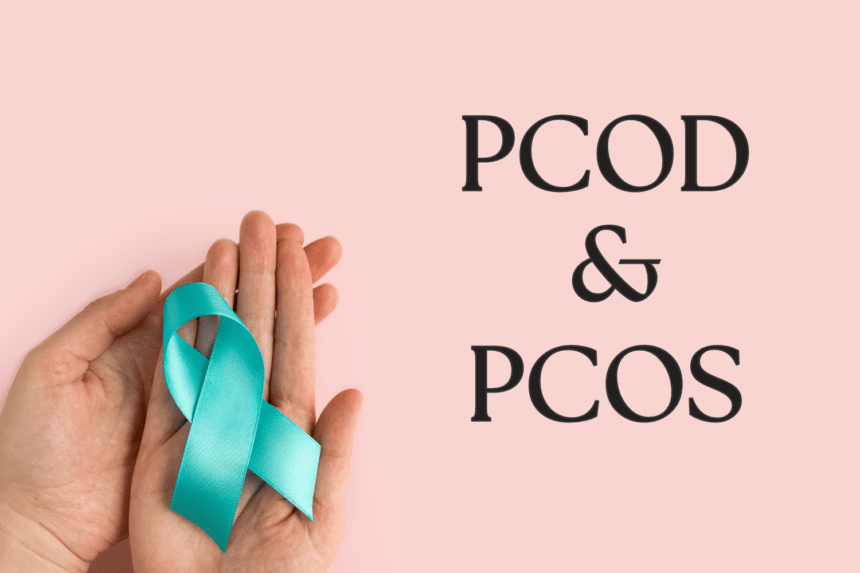Polycystic Ovarian Disease (PCOD) and Polycystic Ovary Syndrome (PCOS) are two hormonal imbalance diseases affecting women of reproductive age. This blog explores the difference between PCOS and PCOD, their symptoms, risks, and treatments to determine the extent of each illness.
PCOS vs PCOD
What is PCOS?
PCOS is a hormonal condition that affects the reproductive years and causes both irregular and prolonged periods. It results in cysts along the outer edge of the ovary that are filled with follicles, or immature eggs, that are unable to release eggs regularly. Although the precise reason is unknown, losing weight and receiving early diagnosis and treatment may lower the chance of developing serious complications, including type 2 diabetes and heart disease.
What is PCOD?
Women with PCOD have significant, low-quality eggs produced by their ovaries, which causes infertility, irregular menstruation periods, weight gain, and hair loss.
Differences: PCOS vs PCOD
1. Fertility problems can arise from PCOS or PCOD. Although irregular ovulation and consequent issues with fertility can be caused by PCOD, PCOS is more likely to fail in the release of eggs.
2. While PCOD may generally be considered less severe, it can still lead to issues like infertility, a chance of miscarriage, early delivery, pregnancy problems, and metabolic problems, if untreated.
3. PCOD can not cause major consequences; however, PCOS can lead to serious concerns such as type 2 diabetes, heart disease, high blood pressure, and endometrial cancer in the later stages.
Common Symptoms of PCOD and PCOS
If we look at the symptoms of PCOS and PCOD, they are quite similar. Below we have mentioned these symptoms that are commonly faced by women.
- Irregular menstruation
- Absence of menstruation
- Heavy menstrual bleeding
- Excessive Hair Growth in the body
- Facial Acne
- Weight gain
- Hair loss
- Skin darkening in different parts of the body
Risk Factors of PCOS and PCOD
1. Hormonal Imbalance
Hormonal disorders in females are caused by an imbalance in the hypothalamic-pituitary-ovarian (HPO) axis and can result in irregular ovulation, elevated androgen levels, and ovarian cysts in PCOD and PCOS. It produces insulin resistance in the body.
2. Genetics
Women with a family history of PCOD or PCOS are more likely to develop it themselves, as genetics play a crucial role.
3. Diet and Exercise
Dietary and exercise habits impact the possibility of developing PCOD or PCOS. An unhealthy diet like processed foods and refined carbs builds insulin resistance in the body.
4. Lifestyle
Lifestyle habits such as smoking, alcohol use, stress, sleep deprivation, obesity, and sedentary behaviors all raise the risk of PCOD or PCOS.
People Also read: Simple and Effective Nutrition Tips for Weight Loss
What are the Treatments for PCOS/PCOD?
PCOS/PCOD diagnosis requires examining symptoms, medications, menstrual periods, weight changes, and physical exams for signs of excess hair growth, insulin resistance, and acne. Below are mentioned these treatments in depth.
1. Pelvic examination: During a pelvic exam, your doctor will examine your reproductive organs to detect masses, growths, or other abnormalities.
2. Blood tests: Blood tests examine hormone levels, cholesterol, triglyceride, and glucose tolerance, removing menstrual abnormalities or androgen excess, which might resemble PCOS. Other testing might include fasting cholesterol and triglyceride readings.
3. Ultrasound: An ultrasound uses a transducer to transmit sound waves, which are subsequently converted into computer-generated pictures, to check the appearance and thickness of the ovaries and the uterine lining.
4. Medicines: Both PCOS & PCOD can be treated with lifestyle changes and the risks can be mitigated with proper medication. There are different medications for each risk associated with PCOS and PCOD, like, ovulation, pregnancy, insulin resistance, excessive hair growth in the body and hair loss. Therefore, It is important that you consult with your doctors before starting any medication or supplements.
People also read: Importance of Regular Health Check-ups
Conclusion
To summarize, both PCOS and PCOD are serious hormonal diseases that afflict women of reproductive age. They share symptoms that include irregular menstruation, weight gain, and hormonal imbalances. PCOS can pose long-term health concerns such as type 2 diabetes and heart disease, whereas PCOD influences fertility and metabolic health. Early diagnosis, lifestyle adjustments, and treatment are vital in preventing both diseases. Understanding the key differences among them aids in improved diagnostic and treatment techniques, ultimately improving the health outcomes of afflicted persons.


Leave a Reply